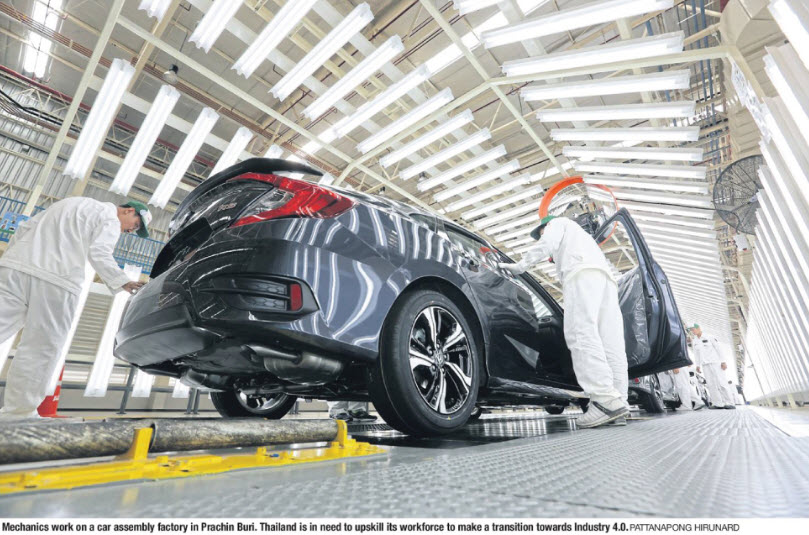| Year | 2016-11-09 |
|---|
Khanittha Hongprayoon
As the world transitions from computer and electronic automation, or Industry 3.0, towards the fourth industrial revolution or Industry 4.0, which features the digitisation of physical assets and processes, Thailand finds it necessary to keep up with the changes, but is it ready?
Like other countries, the public and private sectors in Thailand see the trend as an important revolution. Both sectors have started to look for the right path for preparation, hoping Industry 4.0 could become a mechanism for Thailand to escape the middle income trap status.

Workforce is an essential element. It could be an efficient means of helping Thailand through the transition period. Also, the Thai workforce needs to understand the structure and the basis of the new revolution.
Industry 4.0, which also focuses on the integration of value-chain partners into digital ecosystems, highly involves Artificial Intelligence, technology, data exchange, robotics as well as bio or nanotechnology solutions.
However, only some industries can make the transition towards Industry 4.0.
The Industry 4.0 structure reveals a shift in workforce qualifications. There will be increased demand for workers with high skills, such as technical experts and engineers. In addition, mathematics, computer, architecture and engineering are also key areas.
Technology and mobility will likely take centre stage and replace traditional and administrative work.
Innovation in the use of technology will not only make the labour force more skilled and boost labour productivity, it will also raise household incomes and national revenue. Furthermore, it addresses labour shortage as a result of population decrease and demographic changes.
According to National Statistical Office’s data surveyed in the third quarter of last year, 40.1% of the Thai industrial workforce has acquired only primary education or less. Those possessing degrees in science, engineering, mathematics and computer science represent 10.4% of the labour market.
Last June, Prime Minister Prayut Chan-o-cha insisted that the country was facing a tremendous shortage of engineers, particularly in the hi-tech sector. Thailand has less than 50% of the engineers it needs for this sector.
Among 138 countries, the 2016-2017 global competitiveness report ranks Thailand 63rd in the technological readiness pillar and 54th in the innovation pillar. The total score in each pillar is lower than the average score of the Asia Pacific region.
So is the Thai workforce ready for Industry 4.0? My answer is no.
The distance to the finish line is far, as Thailand lacks both a qualitative and quantitative workforce. The country must try harder to meet the Industry 4.0 norm, especially in terms of skills. Although time and fiscal constraints are dominant obstacles, cooperation among various stakeholders is a compulsory device for closing the demand gap.
But initiation must come from the government which must create related infrastructure and introduce measures, rules and regulations.
It should then list a range of core competencies including knowledge and skill requirements provided by the private sector and make the information available to the public.
Meanwhile, education and training institutes must infuse private sector knowledge and skill requirements into their curriculum. This is a significant tool to teach the Thai workforce new skills.
At the same time, science technology, engineering and mathematics should be integrated and applied to all levels of education.
Such training should be provided to those who have not yet entered the labour market as well as those who are already part of it.
At the beginning of a transition towards Industry 4.0, the right priorities should be given to the right industries, especially those in hi-tech industrial areas. These industries should be carefully selected to be part of pilot projects. Successful cases and obstacles faced should be used as the basis for setting national Industry 4.0 guidelines.
Sustainability must be maintained in these efforts.
Preparing the Thai industrial workforce for Industry 4.0 needs continuous and serious efforts from everyone involved. Otherwise, high-income status will remain a dream for Thailand.
Khanittha Hongprayoon is a researcher at the Thailand Development Research Institute (TDRI). Policy analyses from the TDRI appear in the Bangkok Post on alternate Wednesday.
First published: Bangkok Post on Wednesday, November 9, 2016
